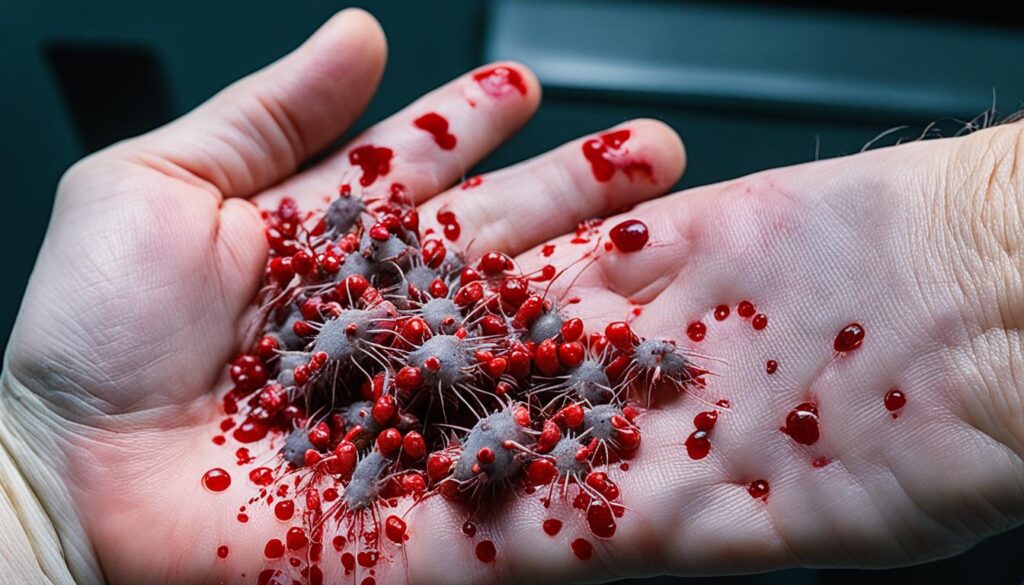Did you realize that rats have the ability to bite humans while they are asleep? It’s a shocking reality that underscores the possible threat posed by these tiny animals. Whether it’s a wild rat searching for food or a pet rat feeling cornered, the danger of a rat bite is legitimate. However, what makes rat bites even more worrisome is the potential for bacterial infections, like rat bite fever.
Key Takeaways:
- Rats can bite humans while they are sleeping, posing a potential threat
- Rat bites can lead to bacterial infections like rat bite fever
- Both wild and pet rats can bite if they feel threatened
- Rat bites should be taken seriously and treated promptly
- Preventive measures can help reduce the risk of rat bites
The Dangers of Rat Bites
Rat bites can pose significant dangers to human health, as they have the potential to transmit various diseases and infections. It is crucial to understand the potential risks associated with rat bites and take appropriate precautions to protect yourself and your loved ones.
One of the most well-known diseases transmitted by rat bites is Hantavirus. This viral infection can cause severe respiratory problems and can be fatal in some cases. Another common infection is leptospirosis, which is caused by bacteria found in rat urine and can lead to symptoms such as fever, muscle pain, and organ damage.
Typhus, another disease that can be transmitted through rat bites, is caused by bacteria carried by fleas that infest rats. This infection can lead to high fever, headache, rash, and severe muscle pain. Meningitis, an inflammation of the brain and spinal cord, can also result from rat bites.
“Rat bite fever is a common bacterial infection that can cause symptoms like fever, vomiting, joint pain, and can be fatal if left untreated.”
In addition to these mentioned diseases, there are several other potential infections and health risks associated with rat bites. It is essential to seek immediate medical attention if you have been bitten by a rat to prevent further complications.
Diseases Transmitted by Rat Bites
| Disease | Symptoms | Complications |
|---|---|---|
| Hantavirus | Fever, cough, shortness of breath | Severe respiratory distress, organ failure |
| Leptospirosis | Fever, muscle pain, headache | Organ damage, kidney failure |
| Typhus | High fever, headache, rash, muscle pain | Pneumonia, kidney failure, heart problems |
| Meningitis | Severe headache, neck stiffness, fever | Brain damage, hearing loss, death |
The dangers of rat bites extend beyond the initial wound. If left untreated, these infections can lead to severe complications and even death. It is crucial to take preventive measures to minimize the risk of rat bites and seek medical attention if bitten.

Symptoms and Treatment of Rat Bites
Rat bites can lead to various symptoms and infections. If you have been bitten by a rat, it is important to recognize the signs of infection and seek appropriate treatment promptly. Here are some common symptoms of rat bites:
- Pain: The bite area may be painful and tender to the touch.
- Redness and swelling: The skin around the bite mark may become red, inflamed, and swollen.
- Pus-filled wounds: In some cases, the bite wound may develop pus, indicating an infection.
- Fatigue and fever: Depending on the specific infection, you may experience fatigue and have an elevated body temperature.
- Muscle aches and headaches: Rat bite infections can cause muscle aches and headaches, similar to flu-like symptoms.
- Chills, nausea, and vomiting: Some infections may lead to chills, nausea, and vomiting.
- Abdominal pain: In rare cases, rat bite infections can cause abdominal pain.
If you suspect that you have been bitten by a rat, it is important to take immediate action:
- Clean the bite wound thoroughly with soap and warm water. This helps remove any bacteria present in the wound.
- Apply a clean dressing to the wound to prevent further contamination.
- Seek medical attention to evaluate the need for antibiotics and other treatments. A healthcare professional can assess the severity of the bite, determine if there is an infection, and prescribe appropriate medications.
Image:

Preventing Rat Bites
Preventing rat bites is crucial to ensure the safety of you and your family. By taking a few precautionary measures, you can significantly reduce the risk of being bitten by rats.
Eliminate Rat Infestations
To prevent rat bites, it is essential to eliminate or control rat infestations in and around your home. Rats are attracted to food sources, so it’s important to make sure they are secured and inaccessible to rodents. Keep all food tightly sealed in containers, and promptly clean up any food spills or crumbs.
Seal all potential entry points that rats can use to access your home. Inspect for gaps or cracks in walls, floors, and foundations. Use steel wool or wire mesh to block any openings, as rats can squeeze through small spaces.
Maintaining cleanliness in your living space is essential to deter rats. Regularly dispose of garbage in tightly sealed bins, and keep your surroundings free of clutter where rats can hide.
Avoid Handling Rats
When it comes to rats, it’s best to avoid handling or petting them altogether. Whether they are wild rats or pet rats, they can still pose a risk of biting. Rats can feel threatened or fearful in certain situations, which may lead to defensive reactions, including biting.
If you come across a rat, maintain a safe distance and allow it to move away on its own. In the case of a potential infestation, it is recommended to seek professional pest control services to handle the situation safely and effectively.
“Preventing rat bites is crucial in protecting yourself and your loved ones from potential health risks. By eliminating rat infestations in your home and avoiding contact with rats, you can minimize the chances of being bitten.”

| Prevention Tips | |
|---|---|
| Secure food sources: | Store food in sealed containers and clean up spills promptly |
| Seal entry points: | Block any openings with steel wool or wire mesh |
| Maintain cleanliness: | Dispose of garbage properly and keep your surroundings clutter-free |
| Avoid handling rats: | Minimize contact with rats to reduce the risk of bites |
What to Do If Bitten by a Rat
If you find yourself bitten by a rat, it’s crucial to take immediate action to ensure your safety and prevent any potential complications. Here are the steps to follow:
- Control the bleeding: Apply direct pressure to the wound with a clean cloth or gauze pad to stop the bleeding. If the bleeding is severe, elevate the affected area and seek medical help.
- Clean the wound: Thoroughly wash the bite area with soap and warm water, gently removing any debris or dirt. This helps reduce the risk of infection.
- Cover the wound: Use a clean dressing or bandage to cover the bite, preventing further contamination and promoting healing.
- Seek medical attention: It’s important to consult a healthcare professional after a rat bite, even if the wound appears minor. They can assess the severity of the bite, evaluate the need for tetanus immunization, and determine if stitches or antibiotic treatment are necessary.
- Trap the rat: If possible, try to capture the rat that bit you. This can help identify if the rat carries any infections or diseases that require specific treatment or preventive measures.
Remember, rat bites can pose serious health risks, including the transmission of diseases. Seeking prompt medical help and following the recommended first aid measures are essential in ensuring proper care and preventing any complications.
Learn more about proper first aid techniques for rat bites from the American Red Cross:

“In the case of a rat bite, it is important to control the bleeding, clean the wound, cover it, and seek medical attention. A healthcare professional can evaluate the need for tetanus immunization, stitches, and antibiotic treatment. Trapping the rat for examination is also recommended if possible.”
Rat Facts That Will Make You Cringe
When it comes to rats, there are some truly gross and disgusting facts that might leave you feeling a little unsettled. These shocking rat behaviors showcase just how fascinating and disturbing these creatures can be. Brace yourself for some eye-opening revelations.
Gross Rat Facts
- Rats carry at least 60 communicable diseases, making them a serious health risk. From leptospirosis to salmonellosis, these diseases can have severe consequences for humans.
- Did you know that rats can actually bite humans while they are asleep? The thought of waking up to a rat nibbling on your finger is enough to send shivers down anyone’s spine.
- Rats have incredibly strong teeth that never stop growing. To keep their teeth in check, they must continuously gnaw on objects like electrical wires, cinderblocks, and lead pipes. This constant gnawing can cause significant damage to homes and infrastructure.
- Female rats are highly prolific creatures. In fact, they can mate with multiple partners and produce up to 2,000 offspring in just one year. This rapid reproduction is one of the reasons why rat infestations can quickly spiral out of control.
And if you thought that was bad, here’s a truly disgusting fact: rats engage in coprophagy, which means they eat their own feces. While it may seem repulsive to us, this behavior helps rats extract any remaining nutrients from their waste, ensuring they get every ounce of nutrition.
“Rats carry at least 60 communicable diseases and can bite humans while they are asleep.”
These facts about rats may be cringe-worthy, but they highlight the unique and sometimes shocking behaviors of these notorious pests. It’s important to be aware of these facts to better understand the health risks associated with rats and take the necessary precautions to keep them out of our lives.

The Risks of Rat Bite Fever
One of the potential complications of rat bites is the development of rat bite fever. This bacterial infection is caused by two types of bacteria, Streptobacillus moniliformis and Spirillum minus. While rat bite fever is not common, it can have serious consequences if left untreated.
If a rat bite goes untreated, it can lead to various complications, including:
- Abscesses: Pus-filled pockets can form around the bite area, causing pain and discomfort.
- Hepatitis: Inflammation of the liver can occur, potentially leading to liver damage.
- Meningitis: Infection and inflammation of the membranes surrounding the brain and spinal cord can cause severe headaches, fever, and neurological symptoms.
- Pneumonia: The bacteria can spread to the lungs, causing infection and respiratory symptoms such as coughing and difficulty breathing.
- Nephritis: Infection and inflammation of the kidneys can lead to kidney damage and impaired kidney function.
Although rat bite fever can be fatal if left untreated, prompt medical intervention with appropriate antibiotic treatment can effectively combat the infection and prevent complications.
In order to raise awareness about the risks associated with rat bite fever, it is crucial to recognize the importance of seeking medical attention after a rat bite and to advocate for proactive measures to prevent rat infestations.
“While rat bite fever may not be common, it is essential to take rat bites seriously and seek medical attention promptly. Delaying treatment can result in serious complications that can have long-lasting effects on your health.”
To visually showcase the risks of rat bite fever, here is a table summarizing its potential complications:
| Complication | Description |
|---|---|
| Abscesses | Pus-filled pockets around the bite area |
| Hepatitis | Inflammation of the liver |
| Meningitis | Infection and inflammation of the membranes surrounding the brain and spinal cord |
| Pneumonia | Infection and inflammation of the lungs |
| Nephritis | Infection and inflammation of the kidneys |

Infections Transmitted by Rats
In addition to rat bite fever, rats can transmit other infections to humans, including salmonellosis, leptospirosis, and the plague. These infections can cause a range of symptoms, such as:
- Stomach cramps
- Diarrhea
- Fever
- Headache
- Muscle aches
- Swollen lymph nodes
If you have been bitten by a rat or have come into contact with rats and experience any of these symptoms, it is crucial to seek prompt medical attention.
Salmonellosis is a bacterial infection that can be transmitted through rat droppings or by consuming contaminated food or water. Symptoms typically include diarrhea, stomach cramps, and fever. Severe cases may require hospitalization.
Leptospirosis is caused by the Leptospira bacteria and can be contracted through contact with rat urine, either directly or indirectly, by coming into contact with water or soil contaminated with urine. Symptoms can range from mild to severe and may include fever, headache, muscle aches, and jaundice.
The plague, also known as the bubonic plague, is a rare but highly infectious disease caused by the bacterium Yersinia pestis. It is typically transmitted through the bites of infected fleas that rats carry. Symptoms include fever, chills, weakness, and the formation of painful, swollen lymph nodes (buboes).
To effectively prevent and manage rat-borne infections, it is important to take preventive measures, such as:
- Keeping your living areas clean and free from food sources that may attract rats
- Sealing any potential entry points to your home to prevent rat infestations
- Avoiding direct contact with rats, whether they are wild or pets
If you suspect a rat infestation in your home, it is best to consult with a professional pest control service to ensure safe and thorough removal.
“Rat-borne infections, such as salmonellosis, leptospirosis, and the plague, can have serious health consequences. Seeking prompt medical attention and taking preventive measures are crucial to protect yourself and your family.”
Comparing Rat-Borne Infections
| Infection | Cause | Symptoms | Treatment |
|---|---|---|---|
| Rat Bite Fever | Bacteria from rat bites or scratches | Fever, vomiting, joint pain, rash | Antibiotics |
| Salmonellosis | Bacteria from rat droppings or contaminated food/water | Diarrhea, stomach cramps, fever | Fluid replacement, antibiotics in severe cases |
| Leptospirosis | Bacteria from rat urine | Fever, headache, muscle aches, jaundice | Antibiotics |
| The Plague | Bacteria transmitted by fleas from infected rats | Fever, chills, swollen lymph nodes | Antibiotics |

Conclusion
In conclusion, rat bites can present serious health risks to humans, including the transmission of diseases such as rat bite fever. It is crucial to take rat bites seriously and seek immediate medical attention to prevent complications.
Prevention is key to ensuring rat bite safety. By eliminating rat infestations in and around our homes, we can significantly reduce the risk of being bitten. This can be done by sealing all entry points, securing food sources, and maintaining cleanliness. Additionally, it is important to avoid any contact with rats, whether they are wild or pets, to minimize the chance of being bitten.
By being aware of the dangers associated with rat bites and taking the necessary precautions, we can protect ourselves and our homes from these potential hazards. It is important to educate ourselves and our communities about rat bite safety to ensure a safer living environment for everyone.










